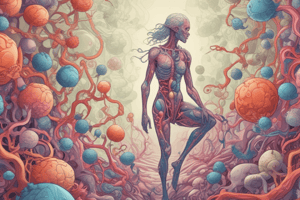Podcast
Questions and Answers
What is a cell?
What is a cell?
The basic unit of all life/living things
What is tissue?
What is tissue?
A group of cells that works together to carry out a particular task in an organism
What is an organ?
What is an organ?
A group of tissues that performs a complex function in a body
What is an organ system?
What is an organ system?
What is an organism?
What is an organism?
What is homeostasis?
What is homeostasis?
What does the skeletal system do?
What does the skeletal system do?
What does the muscular system do?
What does the muscular system do?
What is the function of the digestive system?
What is the function of the digestive system?
What does the circulatory system do?
What does the circulatory system do?
What is the purpose of the excretory system?
What is the purpose of the excretory system?
What does the respiratory system allow?
What does the respiratory system allow?
What is the nervous system?
What is the nervous system?
What does the endocrine system control?
What does the endocrine system control?
What is the immune system responsible for?
What is the immune system responsible for?
What are involuntary muscles?
What are involuntary muscles?
What are voluntary muscles?
What are voluntary muscles?
What is smooth muscle?
What is smooth muscle?
What is cardiac muscle?
What is cardiac muscle?
What is skeletal muscle?
What is skeletal muscle?
Flashcards are hidden until you start studying
Study Notes
Basic Biological Units
- Cell: Fundamental unit of life, comprising all living organisms.
- Tissue: Cohesive group of cells performing specific functions.
Organ Structures
- Organ: Assembly of tissues working together for complex bodily functions.
- Organ System: Collection of organs collaborating to fulfill overall physiological needs.
Living Organisms
- Organism: An individual, self-sustaining living entity.
Homeostasis
- Homeostasis: Mechanism by which organisms regulate their internal environment to maintain stability.
Human Body Systems
- Skeletal System: Composed of bones and joints; protects organs and facilitates movement.
- Muscular System: Enables organ function and bodily movement.
Nutritional and Blood Systems
- Digestive System: Breaks down food for nutrient absorption into the bloodstream.
- Circulatory System: Responsible for the transport of blood and fluids throughout the body.
Waste and Gas Exchange
- Excretory System: Eliminates bodily waste products.
- Respiratory System: Facilitates gas exchange; intake of oxygen and expulsion of carbon dioxide.
Regulatory Systems
- Nervous System: Fast-acting control system managing responses to stimuli via muscles and glands.
- Endocrine System: Regulates hormone production and reproductive functions.
Defense Mechanism
- Immune System: Protects the body against pathogens like viruses and bacteria.
Muscle Types
- Involuntary Muscles: Muscles operating without conscious control, essential for automatic functions.
- Voluntary Muscle: Muscles controlled consciously, allowing for deliberate movement.
Muscle Tissue Types
- Smooth Muscle: Forms the walls of internal organs; characterized by slow reaction and endurance.
- Cardiac Muscle: Unique to the heart, exhibiting slow reaction and sustained endurance.
- Skeletal Muscle: Attaches to bones, known for quick reactions but rapid fatigue.
Studying That Suits You
Use AI to generate personalized quizzes and flashcards to suit your learning preferences.



